ing分词及ed分词教案
大学英语专业语法课件9-ing和ed分词ing and -ed Particple

Note that non-finite construction traditionally refers to infinitive, participle (present & past), and gerund. In our course book, the present participle and gerund are both treated as “– ing participle”. Now let’s review the passive and perfective form of –ing participle.
Non-finite verb as object
• Observe the following pairs of sentences with –ing participles, what differences can you find among them?
• He denied giving any help to the police.
• The theft admitted stealing the picture.
The logical subject is identical with the main clausesubject (V+ -ing participle)
• Do you mind my smoking here?
The passive and perfective form of –ing participle
perdoing
having done
Passive form being done having been done
ing分词用法教案
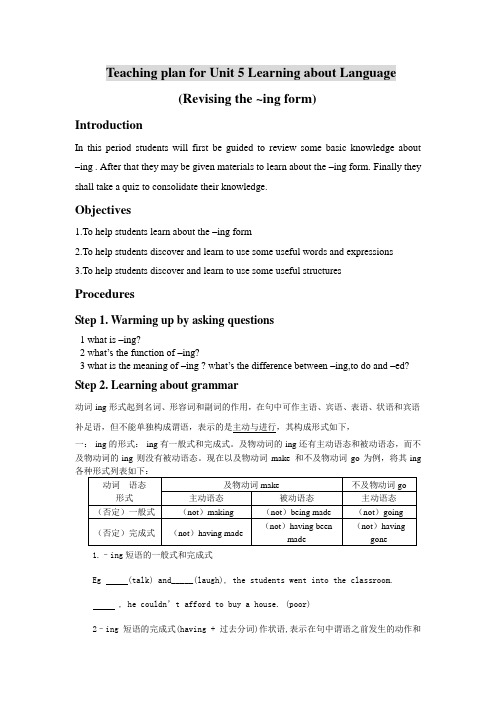
Teaching plan for Unit 5 Learning about Language(Revising the ~ing form)IntroductionIn this period students will first be guided to review some basic knowledge about –ing . After that they may be given materials to learn about the –ing form. Finally they shall take a quiz to consolidate their knowledge.Objectives1.To help students learn about the –ing form2.To help students discover and learn to use some useful words and expressions3.To help students discover and learn to use some useful structuresProceduresStep 1. Warming up by asking questions1 what is –ing?2 what’s the function of –ing?3 what is the meaning of –ing ? what’s the difference between –ing,to do and –ed? Step 2. Learning about grammar动词-ing形式起到名词、形容词和副词的作用,在句中可作主语、宾语、表语、状语和宾语补足语,但不能单独构成谓语,表示的是主动与进行,其构成形式如下,一:-ing的形式:-ing有一般式和完成式。
及物动词的-ing还有主动语态和被动语态,而不及物动词的-ing则没有被动语态。
非谓语动词(动词ing形式和动词ed形式)课件

03
Hale Waihona Puke 动词ed形式可以作为状 语,表示动作发生的时 间、原因、条件等。
04
例如:He was born in 1990.(他出生于1990 年。)
动词ed形式与分词的区别
动词ed形式与分词在语法功能和用法 上存在显著差异。
例如:I have seen the movie.(我 已经看过这部电影了。)(动词ed形 式)
动词ing形式表示正在进行的动作或行为,而动名词表示已经完成或结果的状态。
动词ing形式在句子中做主语或表语时,表示一个动作或行为,而动名词则表示一个 名词概念。
03 动词ed形式
动词ed形式的构成
动词ed形式由动词原形加-ed构成,规则动词的-ed形式一般直接在词尾加-ed。 例如:work -> worked,play -> played。
表示被动关系
如"The book was written by him."。
表示习惯或经常性的行为
如"He likes reading books."。
表示时间或条件状语
如"If you study hard, you will succeed."。
动词ing形式与动名词的区别
动词ing形式既可以作为谓语的一部分,也可以作为独立成分,而动名词只能作为谓 语的宾语或表语。
非谓语动词的语态
主动语态
表示非谓语动词所表示的动作是 由句子主语发出来的。
被动语态
表示非谓语动词所表示的动作不 是由句子主语发出来的,而是被 其他人或物完成的。
非谓语动词时态和语态的用法
过去分词可以用于描述已经完成 的动作或存在的状态,常与时间 状语连用,如“已经”、“已经 完成”、“已经达到”等。
非谓语动词情况下的ing及ed用法
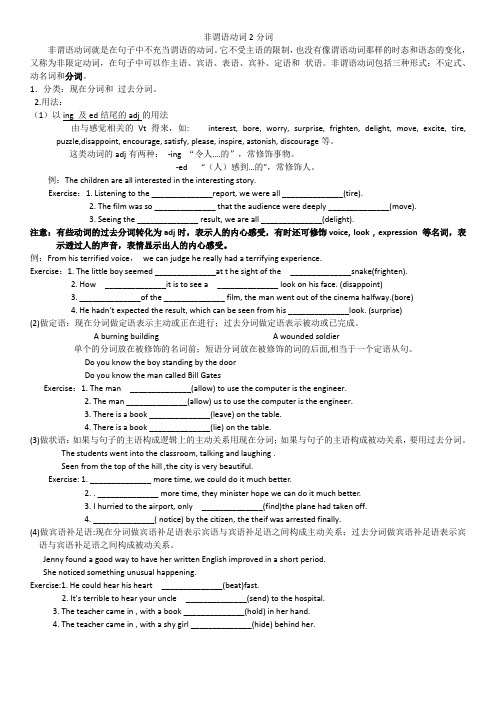
非谓语动词2分词非谓语动词就是在句子中不充当谓语的动词。
它不受主语的限制,也没有像谓语动词那样的时态和语态的变化,又称为非限定动词,在句子中可以作主语、宾语、表语、宾补、定语和状语。
非谓语动词包括三种形式:不定式、动名词和分词。
1.分类:现在分词和过去分词。
2.用法:(1)以ing 及ed结尾的adj的用法由与感觉相关的Vt 得来,如: interest, bore, worry, surprise, frighten, delight, move, excite, tire, puzzle,disappoint, encourage, satisfy, please, inspire, astonish, discourage等。
这类动词的adj有两种:-ing “令人….的”,常修饰事物。
-ed “(人)感到…的”,常修饰人。
例:The children are all interested in the interesting story.Exercise:1. Listening to the ______________report, we were all ______________(tire).2. The film was so ______________ that the audience were deeply ______________(move).3. Seeing the ______________ result, we are all ______________(delight).注意:有些动词的过去分词转化为adj时,表示人的内心感受,有时还可修饰voice, look , expression 等名词,表示透过人的声音,表情显示出人的内心感受。
例:From his terrified voice,we can judge he really had a terrifying experience.Exercise:1. The little boy seemed ______________at t he sight of the ______________snake(frighten).2. How ______________it is to see a ______________ look on his face. (disappoint)3. ______________of the ______________ film, the man went out of the cinema halfway.(bore)4. He hadn’t expected the result, which can be seen from his ______________look. (surprise)(2)做定语:现在分词做定语表示主动或正在进行;过去分词做定语表示被动或已完成。
高考英语语法非谓语动词ing分词和ed分词学习点津
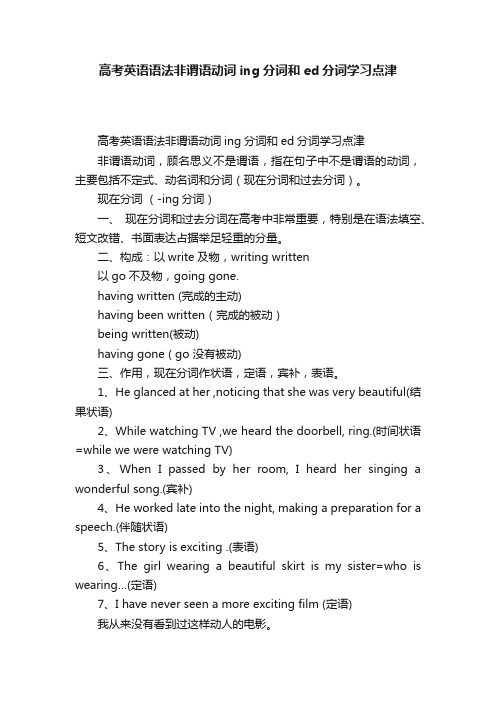
高考英语语法非谓语动词ing分词和ed分词学习点津高考英语语法非谓语动词ing分词和ed分词学习点津非谓语动词,顾名思义不是谓语,指在句子中不是谓语的动词,主要包括不定式、动名词和分词(现在分词和过去分词)。
现在分词(-ing分词)一、现在分词和过去分词在高考中非常重要,特别是在语法填空、短文改错、书面表达占据举足轻重的分量。
二、构成:以write及物,writing written以go不及物,going gone.having written (完成的主动)having been written(完成的被动)being written(被动)having gone ( go 没有被动)三、作用,现在分词作状语,定语,宾补,表语。
1、He glanced at her ,noticing that she was very beautiful(结果状语)2、While watching TV ,we heard the doorbell, ring.(时间状语=while we were watching TV)3、When I passed by her room, I heard her singing a wonderful song.(宾补)4、He worked late into the night, making a preparation for a speech.(伴随状语)5、The story is exciting .(表语)6、The girl wearing a beautiful skirt is my sister=who is wearing…(定语)7、I have never seen a more exciting film (定语)我从来没有看到过这样动人的电影。
8、boiling water (正在沸腾的水)falling leaves (正在下落的叶子)developing countries (发展中的国家)a moving truck (一辆行进的卡车)四、完成式的ing分词(having done结构)的主被动表示动作发生在主句动作之前。
电子教案动词的现在分词
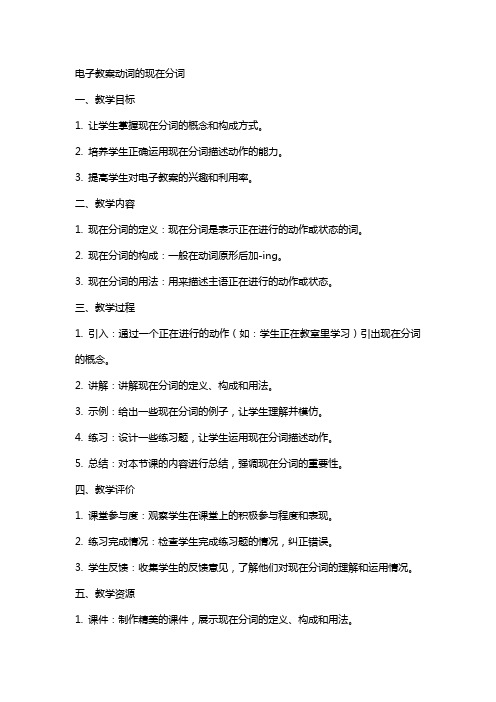
电子教案动词的现在分词一、教学目标1. 让学生掌握现在分词的概念和构成方式。
2. 培养学生正确运用现在分词描述动作的能力。
3. 提高学生对电子教案的兴趣和利用率。
二、教学内容1. 现在分词的定义:现在分词是表示正在进行的动作或状态的词。
2. 现在分词的构成:一般在动词原形后加-ing。
3. 现在分词的用法:用来描述主语正在进行的动作或状态。
三、教学过程1. 引入:通过一个正在进行的动作(如:学生正在教室里学习)引出现在分词的概念。
2. 讲解:讲解现在分词的定义、构成和用法。
3. 示例:给出一些现在分词的例子,让学生理解并模仿。
4. 练习:设计一些练习题,让学生运用现在分词描述动作。
5. 总结:对本节课的内容进行总结,强调现在分词的重要性。
四、教学评价1. 课堂参与度:观察学生在课堂上的积极参与程度和表现。
2. 练习完成情况:检查学生完成练习题的情况,纠正错误。
3. 学生反馈:收集学生的反馈意见,了解他们对现在分词的理解和运用情况。
五、教学资源1. 课件:制作精美的课件,展示现在分词的定义、构成和用法。
2. 练习题:设计一些现在分词的练习题,包括选择题、填空题和句子写作题。
3. 教学视频或音频:提供一些关于现在分词的教学视频或音频资料,帮助学生更好地理解和掌握。
六、教学活动1. 实例分析:通过分析一些现实生活中的例子,让学生了解现在分词在实际场景中的应用。
2. 小组讨论:让学生分组讨论,分享彼此对现在分词的理解和运用经验。
3. 角色扮演:设计一些角色扮演活动,让学生在实际语境中运用现在分词。
七、教学策略1. 互动式教学:鼓励学生积极参与课堂活动,提高他们的学习兴趣和动力。
2. 任务型教学:设计一些实际任务,让学生在完成任务的过程中运用现在分词。
3. 差异化教学:针对不同学生的学习需求和水平,给予个性化的指导和帮助。
八、教学拓展1. 对比过去分词:引导学生对比现在分词和过去分词的异同,加深他们对现在分词的理解。
大学英语专业语法课件9-ing和ed分词ing and -ed Particple

• These verbs include: attempt, begin, can’t bear, continue,
deserve, dread, hate, intend, like, loathe (厌恶), love, need,
Lecture 9 –ing and –ed participle
Note that non-finite construction traditionally refers to infinitive, participle (present & past), and gerund. In our course book, the present participle and gerund are both treated as “– ing participle”. Now let’s review the passive and perfective form of –ing participle.
• The theft admitted stealing the picture.
The logical subject is identical with the main clausesubject (V+ -ing participle)
• Do you mind my smoking here?
• But:
• This kind of matter should be prevented from happening again.
Non-finite verb as object
• There are some verbs that can take either –ing participle or infinitive as object.
过去分词ed和现在分词ing
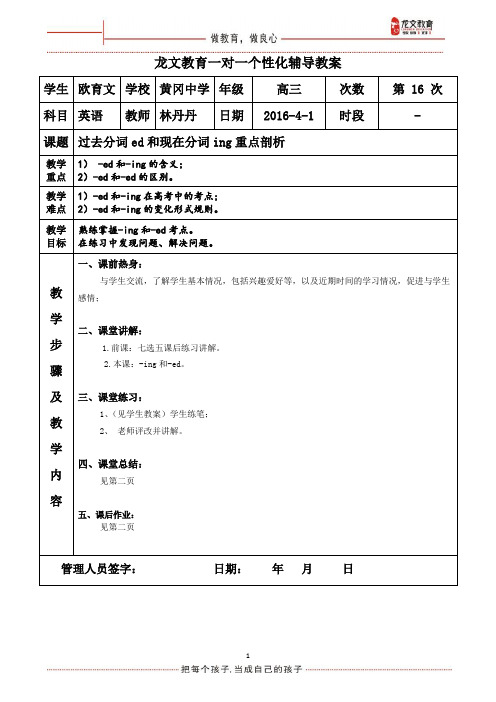
龙文教育一对一个性化辅导教案学生欧育文学校黄冈中学年级高三次数第 16 次科目英语教师林丹丹日期2016-4-1时段-课题过去分词ed和现在分词ing重点剖析教学重点1) -ed和-ing的含义;2)-ed和-ed的区别。
教学难点1)-ed和-ing在高考中的考点;2)-ed和-ing的变化形式规则。
教学目标熟练掌握-ing和-ed考点。
在练习中发现问题、解决问题。
教学步骤及教学内容一、课前热身:与学生交流,了解学生基本情况,包括兴趣爱好等,以及近期时间的学习情况,促进与学生感情;二、课堂讲解:1.前课:七选五课后练习讲解。
2.本课:-ing和-ed。
三、课堂练习:1、(见学生教案)学生练笔;2、老师评改并讲解。
四、课堂总结:见第二页五、课后作业:见第二页管理人员签字:日期:年月日作业布置1、学生上次作业评价:○好○较好○一般○差(勾选)备注:2、本次课后作业:1. 回顾教案2. 完成讲义练习课堂小结家长签字:日期:年月日【课前练笔】一.请找出错误,并加以纠正1.These songs are so popular to young people.2.The work will be finished after two weeks.3.In the age of ten, he began to learn English himself.4.He suddenly returned home in a rainy night.5.He helped the blind man over the street.6.The guide led us over the forest.7.She broke the vase for purpose.8. He has decided to marry with her next month.9. It wasn’t long before he returned to home.10. Don’t read under the sun. 11.Lisa was working in a small firm for the first time I met her.12. She goes to visit her parents in the country once in a month.13. The discovery she has made in medicine is great importance to science.14.Whom do you think the house belongs? 15. Please wait me at the school gate.16. I finished the work on time under the help of him.17. “Help yourselves with the fish. It is very delicious.” Mother said to the guests.18. A hundred of people attend the meeting last night.19. He is a nice person and is quite easy to get along. 20. I was caught by the rain last night.【本课知识】过去分词用法专题透析1. 分词的定义:动词的-ed分词即过去分词,是由动词的过去分词构成,一般只有一种形式。
- 1、下载文档前请自行甄别文档内容的完整性,平台不提供额外的编辑、内容补充、找答案等附加服务。
- 2、"仅部分预览"的文档,不可在线预览部分如存在完整性等问题,可反馈申请退款(可完整预览的文档不适用该条件!)。
- 3、如文档侵犯您的权益,请联系客服反馈,我们会尽快为您处理(人工客服工作时间:9:00-18:30)。
Ing分词The person translating these songs can speak seven languages.The boy standing over there is a classmate of mine .宾语补足语We heard her singing in her room .You can see them performing every night this week at the theatre.状语She sat at the desk reading a newspaperBeing ill, she went homeEd分词完成被动定语Polluted air and water are harmful to people ‘s health.We were given printed question papersThis is one of the houses built last year.宾语补足语He is going to have his hair cut .I must get my bike repaired.状语She walked out of the house followed by her little daughter.Once seen, it can never be forgotten.If bitten by a snake ,you should send for help and walk .现在分词的用法非谓语动词中的现在分词主要起形容词和副词的作用,在句中作定语、表语、补语或状语。
一、现在分词的两个基本特点。
1. 在时间上表示动作正在进行。
例如: a developing country. 一个发展中的国家,boiling water 沸水,rising sun 冉冉升起的太阳。
(试比较: a developed country 一个发达国家,boiled water 白开水,risen sun 升起的太阳)2. 在语态上表示主动。
例如:the ruling class 统治阶级,the exploiting class 剥削阶级。
(试比较:the ruled class 被统治阶级,the exploited class 被剥削阶级)二、掌握现在分词的基本功能。
1. 现在分词作定语,表示正在进行的或主动的动作。
也可以说明被修饰词的性质和特征,此时可换成相应的定语从句。
例如:①There was a terrible noise ___________ the sudden burst of light. (NMET 1989)A. followedB. followingC. to be follow edD. being followed分析: B 。
表示主动的动作,句意是:雷声跟着闪电。
此处的following =which followed 。
②He saw a ________ bird and raised his bow.A. flyB. flyingC. flewD. to be flying分析: B 。
表示正在进行的动作,句意是:正在飞的鸟。
此处的 a flying bird = a bird which was flying 。
③I was satisfied with the _________ speech.A. exciteB. excitingC. excitedD. be excited分析: B 。
表示被修饰词speech 的性质和特征,此处的the exciting speech =the speech that/which was exciting 。
2. 现在分词作状语时,可作时间、条件、结果、原因和伴随状语,表示正在进行的或主动的动作。
此时分词的逻辑主语就是主句的主语,因此要注意人称、时态和语态的一致性。
例如:①The visiting minister expressed his satisfaction with the talks, ________that he had enjoyed his stay here. (NMET 1994)A. having addedB. to addC. a ddingD. added分析: C 。
句意:来访的大臣表示了对谈判的满意,同时又补充说道他呆在这里很愉快。
adding 作伴随状语,表示主动的动作。
所以应用现在分词作伴随状语。
②European football is played in more than 80 countries, ___ _______ it the most popular sport in the world. (NMET 1998)A. makingB. makesC. madeD. to make分析: A 。
句意:欧式足球在80 多个国家开展,其结果是它使欧式足球成为世界上最受欢迎的体育运动。
making 是现在分词作结果状语。
③________ from the top of the hill, we can find that the city looks more beautiful.A. SeeingB. SeenC. SawD. To be seeing分析: A 。
Seeing 是逻辑主语就是主句的主语we ,表示正在进行的主动动作。
3. 现在分词作补足语,表示正在进行的或主动的动作。
例如:①Soon they could see the steam _________ from the wet clot hes.A. riseB. risingC. ris enD. be rising分析: B 。
句意:很快他们看见蒸气从湿衣服上升起。
rising 现在分词作宾语补足语,表示正在进行的动作。
②The missing boys were last seen ________ near the river. (NMET 1994)A. playingB. to be playingC. playD. to play分析: A 。
句意:失踪的男孩们最后被看到时是他们正在河边玩耍。
现在分词作主语补足语。
4. 现在分词的独立主格结构作状语。
例如:①With his lips still ________, he couldn't say a word.A. tremblingB. trembleC. t o trembleD. to be trembling分析: B 。
句意:他说不出话,因为他的嘴唇在颤动。
现在分词的独立主格结构作原因状语,表示正在进行的动作。
②“Mama! ”he cried suddenly, tears rolling down his cheeks. “妈妈!”他突然哭着喊,泪水从他的脸上流下来。
(这里需要用现在分词的独立主格结构tears rolling down his cheeks 作状语。
)③Weather permitting, we'll go to the Great wall. 如果天气允许的话,我们就去长城。
(这里需要用现在分词的独立主格结构Weather permitting 作状语。
)Ed分词分词的定义:动词的-ed分词即过去分词,是由动词的过去分词构成,一般只有一种形式。
定语Polluted air and water are harmful to people ‘s health.We were given printed question papersThis is one of the houses built last year.宾语补足语He is going to have his hair cut .I must get my bike repaired.状语She walked out of the house followed by her little daughter.Once seen, it can never be forgotten.If bitten by a snake ,you should send for help and walk .1) 过去分词作表语,主要表示主语的心理感觉或所处的状态。
如:1)I’m very interested in the intersting story, so will read it again.2)We can’t drink boiling water , but we can drink boiled water.3)Polluted air and water are harmful to people’s health.2) 过去分词做定语1)I found a lot of moved students, who were deeply moved by the moving film.2)China is still a developing country while Japan is already a developed country.3)The astonished expression on his face suggested that he know nothing about the matter.过去分词短语作定语通常放在被修饰的词后面,相当于一个定语从句。
如:Is there anything planned for tomorrow? 明天有什么活动吗?The suggestion made by the foreign expert was adopted by the manager.过去分词作定语也可用作非限制性定语,前后用逗号隔开。
如:The books, written by Lu Xun, are popular with many Chinese people. The meeting, attended by one thousand students, was a success.3) 过去分词做状语:Accepted by the Party, he decided to devote his life to the cause of the Party.Deeply moved by the story, the excited people stopped quarrelling with each other.Given another chance, he will do better.再给他一次机会,他会做得更好。
